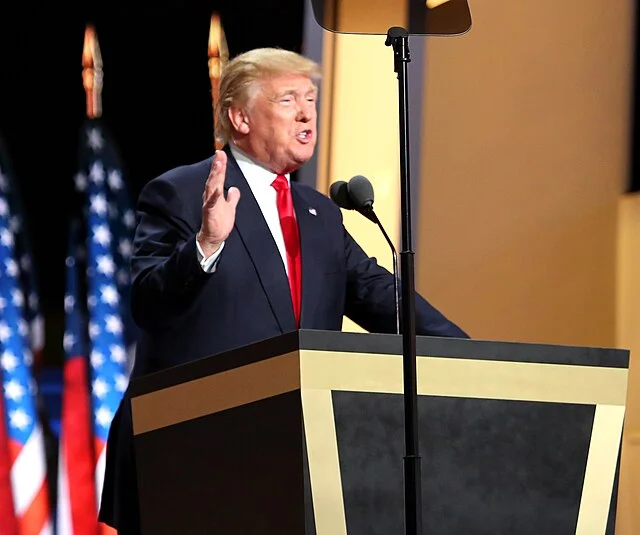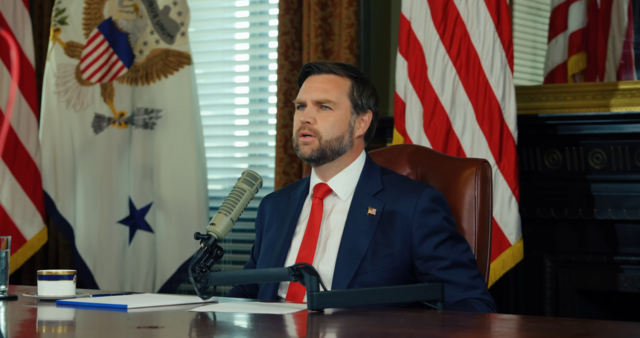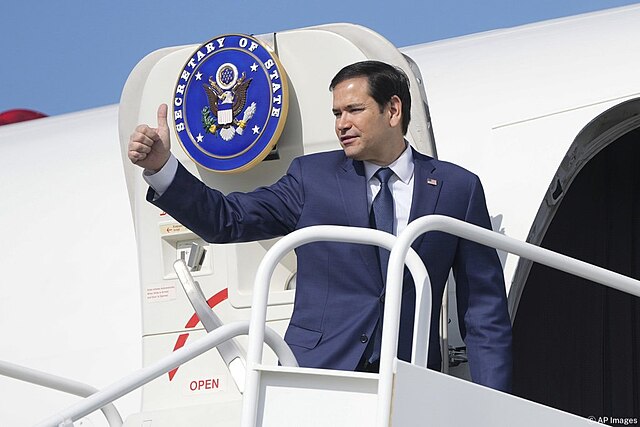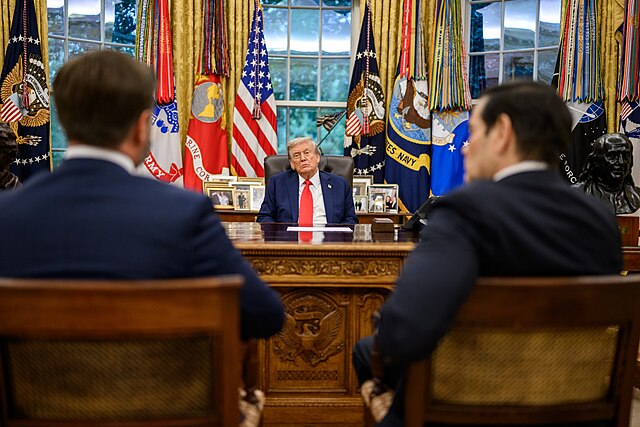
And it is serious now, isn't it? This isn't the stuff of late-night radio conspiracy theorists anymore. We've had multiple Congressional hearings, whistleblowers with impeccable credentials, and a new documentary featuring 34 senior government officials making rather extraordinary claims about what's been flying about in restricted airspace. The Age of Disclosure, which premiered at SXSW earlier this year, has rather dramatically reframed the conversation—whether you buy into its conclusions or not.
So the question becomes: as we look ahead to 2028, which potential presidents are actually likely to do something about UAP transparency? Let's have a proper look.
If Trump's recent comments are anything to go by, the two men he's mentioned most prominently as potential successors are Vice President JD Vance and Secretary of State Marco Rubio. And here's the thing—both are demonstrably interested in the UAP issue. Not in a "wink-wink, little green men" sort of way, but in a "this is a genuine national security concern" manner.

Vance has been remarkably candid about his interest in UAPs. Speaking on the Ruthless podcast back in August, he admitted he's "obsessed with the whole UFO thing" and pledged to spend congressional recess time digging into what he calls "the UFO thing from last year."
More recently, on Miranda Devine's Pod Force One podcast, Vance went rather further, suggesting that UAPs might represent "spiritual forces working on the physical world." Whether you find that perspective enlightening or alarming probably depends on your worldview, but it's certainly... distinctive. He's positioned himself as someone who wants answers, even if—as he put it—"it'll take a long time" to get to the bottom of it.
JD Vance's transparency pledge raises an interesting question: is this genuine commitment or savvy positioning for a 2028 run? The man's 41 years old, deeply connected to the MAGA base, and clearly the heir apparent. If he's serious about UAP investigation, a Vance presidency could represent the first administration truly committed to transparency on this issue.

Rubio's been at this rather longer than Vance. As former vice chairman of the Senate Intelligence Committee, he's been pushing for UAP transparency since at least 2021, when he co-sponsored legislation establishing what would become the All-domain Anomaly Resolution Office (AARO).
He's featured prominently in The Age of Disclosure, stating that "we've had repeated instances of something operating in the airspace over restricted nuclear facilities—and it's not ours." That's not speculation; that's a sitting Secretary of State acknowledging we've got unidentified craft buzzing about our most sensitive military installations.
We've had repeated instances of something operating in the airspace over restricted nuclear facilities—and it's not ours.
Rubio's also been vocal about whistleblowers who've come forward, noting that many hold "very high clearances and high positions within our government." His question—"what incentive would so many people with that kind of qualification have to come forward and make something up?"—cuts rather to the heart of the matter.
Trump's mentioned both men as potential successors, even joking that a Vance-Rubio ticket would be "unstoppable." For UAP disclosure advocates, such a pairing would be... well, rather remarkable, actually. Two men with demonstrated interest in the topic at the top of the ticket.
Of course, the presidency doesn't exist in a vacuum. Congressional pressure matters enormously, and here's where things get interesting. Representative Anna Paulina Luna (R-Florida) now chairs the Task Force on the Declassification of Federal Secrets, and she's been absolutely relentless on UAP transparency.
Luna's made rather extraordinary claims herself—including having seen classified evidence of what she describes as "interdimensional beings"—but more importantly, she's been pushing for concrete legislative action. Congressional pressure has been mounting, with Luna recently demanding NASA release classified images from the 3I/ATLAS interstellar object.
She's working alongside Representative Tim Burchett (R-Tennessee), who's been equally vocal about what he calls a Pentagon "cover-up," and Representative Jared Moskowitz (D-Florida), making this a genuinely bipartisan effort. They've introduced the UAP Whistleblower Protection Act and have been holding regular hearings with increasingly dramatic testimony.
This congressional coalition matters because whoever wins in 2028 will face continued pressure from legislators who've staked their reputations on this issue. It's no longer politically risky to demand UAP transparency—if anything, it's becoming expected.
Beyond Vance and Rubio, the 2028 field is already taking shape, and most potential candidates have been... shall we say, diplomatically silent on UAPs.
Governor Ron DeSantis (R-Florida), who ran unsuccessfully in 2024, hasn't staked out a clear position. Neither has Governor Glenn Youngkin (R-Virginia), Senator Tim Scott (R-South Carolina), or Senator Rand Paul (R-Kentucky)—all potential Republican contenders. DeSantis's 2024 campaign implosion means he'd face an uphill battle for credibility on any issue, frankly.
On the Democratic side, Governor Gavin Newsom (California) appears the front-runner at the moment. He's been raising his profile considerably, particularly after the June 2025 Los Angeles protests response boosted his standing. But on UAPs? Radio silence. The same goes for former Transportation Secretary Pete Buttigie, former Vice President Kamala Harris, and Minnesota Governor Tim Walz.
That silence is rather telling. For decades, touching the UFO topic was political suicide. Now it's becoming increasingly mainstream—yet most potential Democratic candidates haven't taken a position. That could be strategic caution, or it could suggest a Democratic administration might prioritize other issues entirely.
Understanding the 2028 candidates requires understanding where we are now with UAP disclosure. And it's rather a lot more advanced than most people realize.
The National Defense Authorization Act for Fiscal Year 2024 mandated the establishment of a comprehensive UAP records collection at the National Archives, with federal agencies required to review and organize all UAP-related records for potential public disclosure. That deadline is September 2025—so we should be seeing documents released imminently.
There have been multiple congressional hearings throughout 2024 and 2025, with whistleblowers providing increasingly specific testimony. Former intelligence officer David Grusch claimed under oath that he knows the "exact locations" of recovered UAPs and "non-human biologics." Navy Commander David Fravor described the now-famous "Tic Tac" incident off San Diego in 2004. Former Pentagon official Luis Elizondo has written bestselling books about his time investigating UAPs.
For those seeking a complete guide to UAP disclosure and government transparency, the landscape has never been more complex—or more promising.
Here's where we need to be rather careful. "Disclosure" means different things to different people. For some, it means admitting we've recovered alien spacecraft and have been reverse-engineering them for decades. For others, it simply means acknowledging that our military regularly encounters unexplained aerial phenomena that represent potential security risks.
A Vance or Rubio presidency would likely mean continued pressure on the Pentagon and intelligence agencies for transparency, stronger whistleblower protections, and perhaps most importantly, destigmatization of the topic within the military. Pilots currently fear reporting UAP encounters because it can affect their security clearances and career prospects. That culture needs changing regardless of what UAPs actually are.
Whether either man would push for full disclosure of recovered materials or alleged crash retrievals is rather more difficult to say. The Pentagon and intelligence community have considerable institutional resistance to such transparency, and even a committed president faces significant bureaucratic obstacles.
There's always the possibility of a complete outsider shaking up the 2028 race. Trump himself was considered a longshot in 2015. Someone could emerge with UAP transparency as a central campaign platform—though that still feels rather unlikely for a winning candidate.
More plausibly, events could overtake politics entirely. If there's a major UAP incident that can't be explained away—something captured on multiple sensors with clear evidence available to the public—the disclosure question might resolve itself regardless of who's in office.
Some in the UAP community believe we're approaching a critical juncture. The September 2025 deadline for the National Archives records collection, combined with continued congressional pressure and increasing mainstream media coverage, could create momentum that any 2028 administration would find difficult to resist.

If you're hoping for genuine UAP transparency, the 2028 election matters enormously. A Vance presidency would likely represent the most committed White House approach to UAP investigation in American history. Rubio would bring similar interest plus years of legislative experience on the issue. Either would be a significant upgrade over previous administrations' approach.
A Newsom or other Democratic presidency? Much harder to predict. The topic hasn't been a priority for Democratic candidates thus far, which could mean either cautious skepticism or simply other priorities taking precedence.
The Congressional coalition pushing for transparency—Luna, Burchett, Moskowitz, and others—will continue their work regardless of who occupies the Oval Office. But presidential leadership matters. Access to classified information matters. The ability to direct Pentagon and intelligence agency policy matters.
We're in rather uncharted waters here. For the first time in modern American history, UAP disclosure is a legitimate political issue rather than fringe conspiracy theory. The 2028 candidates—those who've engaged with the topic seriously—represent potential turning points in government transparency.
Whether that transparency reveals recovered alien technology, advanced human craft, or simply a more mundane explanation for decades of unexplained sightings remains to be seen. But after years of official denial and ridicule, even asking the question seriously would represent rather significant progress.
The truth might not be "out there" after all. It might be locked in Pentagon filing cabinets, awaiting a president willing to bring it into the light.
